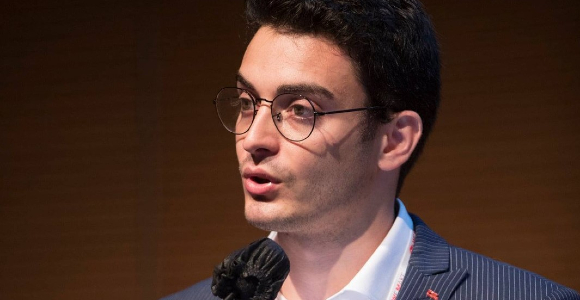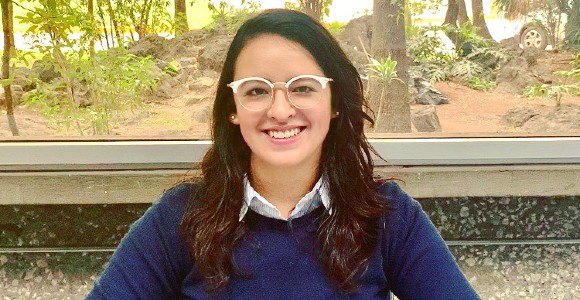
PhD School with international outlook
The research environments and the PhD school of the Faculty of Business and Social Sciences are enjoying great success with their international collaborations. The success attracts competent PhD students to SDU and boosts research excellence
The PhD school of the Faculty of Business and Social Sciences has about 70 PhD students. They work in many different fields of research across faculty departments and centres.
Domen Bajde is the Head of the PhD School. In collaboration with the research environments of the faculty, he organises and develops the PhD programme.
- The Faculty of Business and Social Sciences is large and covers a wide range of highly specialised research areas. Because of this, our PhD students often only work together with a few other PhD students and researchers on their project, he reports.
That’s why international PhD courses and global collaborations are important for the PhD School, Domen Bajde explains. They provide students with a network and make SDU an attractive place to do research.
An example of a collaboration can be found in the field of consumer culture research with the PhD course ‘Consumption Theory: A Canon of Classics’. Another example is the ‘European Doctoral School of Demography’, which is an international collaboration between research environments and focuses on demographics.
Below you can read more about the initiatives and meet two PhD students who have found their way to SDU.
Cutting-edge research in consumer culture
The ‘Canon of Classics’ PhD course in consumer culture theory also goes by the name ‘The Odense Seminar’. This one-week course brings together researchers and PhD students at SDU for seminars, academic mentoring and networking events. The course is part of a series of courses known as the European Doctoral School of Consumer Culture Theorizing, which is a collaboration between SDU, University of Lille, Middle Eastern Technical University and University of London.
Søren Askegaard, Professor of Consumer Culture at the Department of Business & Management, is responsible for the course and has taken an active part in it since the first one was launched in the early 90s.
According to Søren Askegaard, the PhD course helps to put SDU on the world map:
- Canon of Classics makes SDU a global hub within our field of research. Over the past 20 years, most PhD students in Consumer Culture Theory have attended the course in Odense, helping to consolidate SDU as one of the leading research environments in this area, says Søren Askegaard, elaborating:
- Research on consumer culture is a niche field, and we don’t have a critical mass of PhD students, neither at SDU nor other universities, to set up a PhD programme on our own. That’s why international cooperation is so important. In addition, it gives students a fantastic network.
Meet a PhD student from the Canon of Classics course
Federico Mangió
- PhD student at the University of Bergamo, Italy
- Participated in the Canon of Classics course held at SDU in August 2021
- Then spent three months as a visiting student at SDU in the autumn of 2021

What is your PhD project about?
I’m looking at competing markets which do not achieve broad legitimacy or acceptance in society, such as the gun and cannabis market. My PhD project explores how markets arise and fare over time. And then I try to deconstruct the historical and socio-cultural dynamics which support them.
How did the course in Odense help your PhD project?
The course played an important role for me and my PhD project. Because my background is in business economics, not Consumer Culture Theory, it was instructive to get new perspectives on my research. At SDU I was met by a very welcoming research community and got to expand my network. I am still in touch and collaborate with several of the researchers I met at the course.
What is the most important thing you have taken away from the course?
The course gave me a new understanding of what theory is and provided great opportunities for thorough academic studying. It was all about learning for the sake of learning and really understanding social science theory. Another thing I took away from the course is the researchers’ passion for their subjects. They are extremely committed to sharing their knowledge with us PhD students, and that has been a great inspiration to me.
Cooperation strengthens research
The Interdisciplinary Centre on Population Dynamics (CPop for short) falls within the Faculty of Business and Social Sciences and is an interdisciplinary research centre which investigates the causes and consequences of demographic change.
Research on demographics is a minor field, which is why CPop at SDU and a number of other demographics environments in Europe have teamed up to create the European Doctoral School of Demography, an 11-month programme in demographics targeted at prospective PhD students.
Annette Baudisch is a Professor wsr at CPop. She says that international cooperation is absolutely crucial when hiring PhD students at CPop. Indeed, many of the Centre’s current employees have been students at the European Doctoral School of Demography.
- The programme is a great asset to us because it provides the PhD students with the exact background knowledge and experience we seek. This allows us to seek out those students who have the best profile compared to the PhD projects we have at CPop, Annette Baudisch says.
Meet a PhD student from CPop
Paola Vázquez-Castillo
- PhD student at CPop since September 2021
- Student at the European Doctoral School of Demography from 2020-2021
- BSc in Insurance Mathematics at Universidad Nacional Autónoma, Mexico and MSc in Demography at El Colegio de México

What is your PhD project about?
I am interested in calculating the age at which the most people die during a given year. This age should be distinguished from life expectancy since it is not an average but the most frequent age. This age is a tool for measuring longevity and can also be helpful to understand the death trajectories of different generations. In my project, I will be estimating this age, forecasting it, and using it to understand death patterns of currently alive generations.
What is it like to be a PhD student at CPop?
At CPop, I get the opportunity to discuss my ideas with people who are experts in this field. This has helped me broaden my horizons, and I have been introduced to new literature. In addition, CPop facilitates the mathematical and programming tools that I need to complete my PhD project.
What is the most important thing you are going to take away from your time at CPop?
I have learned the importance of being part of a strong academic community where dialogue and feedback from colleagues improves the quality of my work. That why’s to me, CPop is a brilliant example of how collaboration reinforces research.
Important collaborations
The Canon of Classics and the European Doctoral School of Demography are just some of the initiatives that strengthen the PhD environments of the Faculty of Business and Social Sciences.
In addition to contributing to close cooperation between SDU and international universities, according to Domen Bajde, Head of the PhD School, it also serves as a good example of how a fairly small PhD school can spearhead interesting and rewarding collaborations and courses.
The hero picture is from The Canon of Classics course. Professor Søren Askegaard is sitting in the middle.
The PhD school of the Faculty of Business and Social Sciences
Get the latest news from the PhD school and learn more about the different PhD courses